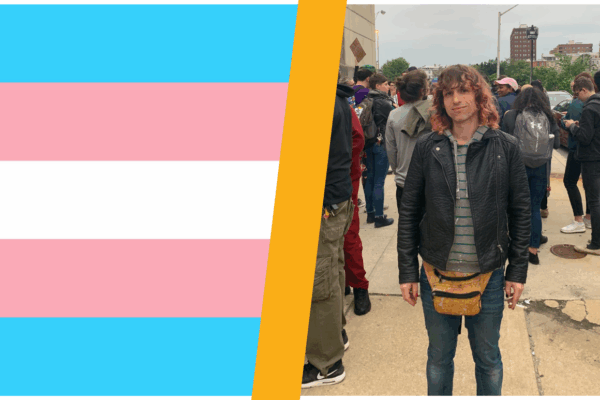During the height of the protests against the John Hopkins University private police force, many brave students and community members resisted peacefully on campus against a new force that represented a real, unaccountable threat, especially to students and community members of color.
On May 7, after protests lasting for months, Hopkins President Ron Daniels decided to shut down the sit-in they had been holding and had several people arrested. One of them was Opal Phoenix, a transwoman who Baltimore Police incorrectly put in a male van, instead of the car that coincided with her gender identity.
“They promised they would put me in the right cell,” said Opal. “They even put out a press release saying that. But they lied.” The experience of being arrested and stripped down in front of male officers was “humiliating,” Opal said. “The guards kept calling me a tranny and a transgender. I very much felt not human in that situation.”
One of the many unconstitutional and illegal actions detailed in the 2016 U.S. Department of Justice report on the Baltimore Police Department said, “We also have concerns that officers’ interactions with women victims of sexual assault and with transgender individuals display unlawful gender bias.”
“The police selectively choose who they help and don’t help,” said Opal. “Trans people are, unfortunately, not helped.”
Recalling a separate personal situation that she wanted to keep private, Opal said: “When I was almost murdered, I called the police. When they arrived, they pointed their guns at me.”
The criminal justice system continues to fail gender non-conforming people. Ignoring hate crimes and transphobic rhetoric against trans people comes at the cost of so many lives.
While Maryland has legal protections for transgender people that could be used to defend trans rights, including the state’s anti-discrimination law, it’s a different story on the federal level, which does not explicitly consider sexual orientation and gender identity as protected under civil rights laws.
The Trump administration has enforced detrimental federal policies, which include not allowing trans people to use school and public bathrooms according to their gender, the ban on trans people in the military, and the most recent U.S. Department of Health and Human Services rule allowing health care providers to discriminate and deny health/medical services to trans people, which can have lethal consequences.
This year so far more than ten trans people have been killed in the U.S. through violent means or died due to, in some way, neglect. All of them were trans women of color, with the overwhelming majority being Black trans women: Dana Martin, Claire Legato, Muhlaysia Booker, Johana 'Joa' Medina, Michelle ‘Tamika’ Washington, Paris Cameron, Jazzaline Ware, Chynal Lindsey, Layleen Polanco, Chanel Scurlock, and in addition, Ashanti Carmon and Zoe Spears who were both killed in Maryland.
“We feel invisible,” said Opal. “Our deaths are overlooked, not investigated, and erased.”
We cannot move backwards, as Trump’s rollbacks on protective policies for trans people would have us do, but we must move forward for a better future that is welcoming, supportive, and humane to all.
Work is being done in Maryland to create more inclusive spaces and a better environment for all. Trans and non-binary people are leading these movements for their rights and championing for more equitable laws. In Baltimore, a bill requiring that all single-use bathrooms be gender-neutral has been signed to law by Mayor Young. The Baltimore Trans Alliance testified in support of this bill that made bathrooms more accessible to all people.
In Maryland, trans students recently had a victory in court when a federal judge ruled that transgender students’ access to restrooms and locker rooms that align with their gender identity is protected by law. These laws and victories in court are only the beginning of a better future where our trans community can continue living and thriving.
“We are a beautiful community, trying to make the world better,” said Opal. “We work really hard to protect each other by creating our own support systems. We are involved because we care.”
From Marsha P. Johnson and Sylvia Rivera, who cofounded the gay and transvestite advocacy organization S.T.A.R., to Lucy Hicks Anderson who advocated for marriage equality, trans people continue to build up strong communities, support each other, fight for the rights of all, and resist oppression in all directions. Let us give homage to these iconic trans women of color in history, who paved the way, and let us continue to support and advocate for trans rights throughout the year.
“Trans people are not a sad story,” said Opal. “We are a strong, resilient story.”

